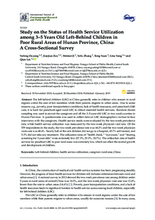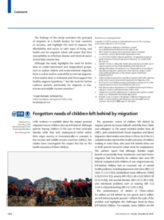Displaying 161 - 170 of 323
This study used magnetic resonance imaging to compare adolescent AIDS orphans reared in institutions with a sex- and age-matched group of healthy adolescents reared in families in China using a voxel-based morphometry analysis.
"About 69 million rural children [in China] are left behind while one or both parents work far away, according to UNICEF," says this article from the Los Angeles Times. The article discusses the ways in which these "left-behind children" in rural areas of China lack access to education and lag behind their urban peers in educational attainment.
Outlining developments with reference to relevant studies, this review characterizes the perspectives used to explore and understand the phenomenon of children being left behind in rural China by parents going to work in cities.
This study evaluated the health service needs of left-behind children ages 3-5 years old in Hunan Province, China.
The aims of this study were to systematically evaluate and comparatively analyse the mental health status of left‐behind children (LBC) in China and to provide a scientific basis for mental intervention and healthy education for LBC.
This dissertation examines the communication between left-behind children in China and their migrant parents from the three-level perspective of relational maintenance (Dainton, 2003): the self, the system, and the network contexts.
This open access article explores three related phenomena: first, the abandonment and institutionalization of children with disabilities in China that increased disproportionately in the 2000s; second, the important relationships between such abandonments, culture, economics, and politics in contemporary China; and third, the relationship between such abandonments, the increasing rates at which Chinese orphans with disabilities are being adopted to Western countries through Inter-country Adoption (ICA), and the global politics of ICA and disability.
The Christian Alliance for Orphans has offered this challenge grant opportunity to spark innovation as child-serving organizations create or expand effective family care solutions for children. The organizations have reported their progress in a series of videos.
The goal of this study was to simultaneously examine the independent and interactive effects of paternal and maternal corporal punishment, and child temperament on child emotion regulation over time in China.
This systematic review of children left behind by migrant parents by Gracia Fellmeth and Kelly Rose-Clarke and colleagues in The Lancet included studies from all LMICs, and considered both forced migration and labour migration.


